出国留学常用对话----段琛
出国留学英语对话范例
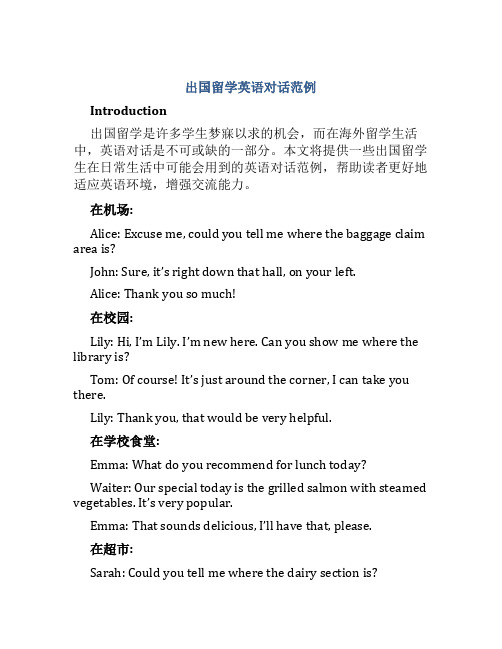
出国留学英语对话范例Introduction出国留学是许多学生梦寐以求的机会,而在海外留学生活中,英语对话是不可或缺的一部分。
本文将提供一些出国留学生在日常生活中可能会用到的英语对话范例,帮助读者更好地适应英语环境,增强交流能力。
在机场:Alice: Excuse me, could you tell me where the baggage claim area is?John: Sure, it’s right down that hall, on your left.Alice: Thank you so much!在校园:Lily: Hi, I’m Lily. I’m new here. Can you show me where the library is?Tom: Of course! It’s just around the corner, I can take you there.Lily: Thank you, that would be very helpful.在学校食堂:Emma: What do you recommend for lunch today?Waiter: Our special today is the grilled salmon with steamed vegetables. It’s very popular.Emma: That sounds delicious, I’ll have that, please.在超市:Sarah: Could you tell me where the dairy section is?Employee: Sure, it’s at the back of the store, on the right.Sarah: Thanks a lot!在公共交通工具上:Mike: Is this seat taken?Sara: No, it’s free. You can sit here.Mike: Thank you.在社交场合:Peter: Hi, I’m Peter. What’s your major?Sophie: Hi, I’m Sophie. I’m majoring in Economics. How about you?Peter: I’m majori ng in Computer Science. Nice to meet you.在课堂上:Professor: Today we will be discussing Shakespeare’s sonnets. Any questions so far?Jane: Could you explain the meaning of the third sonnet?Professor: Of course, it’s about…总结以上是一些出国留学生可能会用到的英语对话范例,这些对话准确简洁地传达了基本信息,有助于提高交流效率。
留学文案面试题及答案
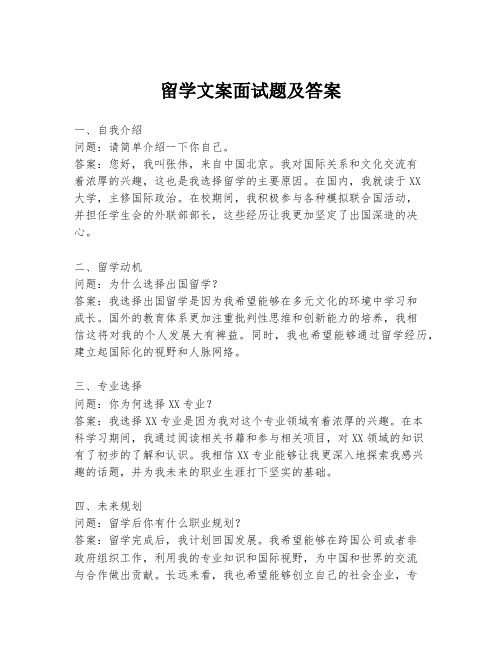
留学文案面试题及答案一、自我介绍问题:请简单介绍一下你自己。
答案:您好,我叫张伟,来自中国北京。
我对国际关系和文化交流有着浓厚的兴趣,这也是我选择留学的主要原因。
在国内,我就读于XX大学,主修国际政治。
在校期间,我积极参与各种模拟联合国活动,并担任学生会的外联部部长,这些经历让我更加坚定了出国深造的决心。
二、留学动机问题:为什么选择出国留学?答案:我选择出国留学是因为我希望能够在多元文化的环境中学习和成长。
国外的教育体系更加注重批判性思维和创新能力的培养,我相信这将对我的个人发展大有裨益。
同时,我也希望能够通过留学经历,建立起国际化的视野和人脉网络。
三、专业选择问题:你为何选择XX专业?答案:我选择XX专业是因为我对这个专业领域有着浓厚的兴趣。
在本科学习期间,我通过阅读相关书籍和参与相关项目,对XX领域的知识有了初步的了解和认识。
我相信XX专业能够让我更深入地探索我感兴趣的话题,并为我未来的职业生涯打下坚实的基础。
四、未来规划问题:留学后你有什么职业规划?答案:留学完成后,我计划回国发展。
我希望能够在跨国公司或者非政府组织工作,利用我的专业知识和国际视野,为中国和世界的交流与合作做出贡献。
长远来看,我也希望能够创立自己的社会企业,专注于文化交流和国际合作。
五、面对挑战问题:你认为留学过程中会遇到哪些挑战,你打算如何应对?答案:留学过程中可能会遇到的挑战包括语言障碍、文化适应、学术压力等。
为了应对这些挑战,我计划在出国前加强语言学习,提高自己的英语水平。
同时,我也会通过阅读和网络资源,提前了解目标国家的文化和生活习惯。
此外,我会积极参与学校的辅导和支持服务,以应对学术上的挑战。
六、为什么选择我们问题:为什么选择我们学校?答案:我选择贵校是因为贵校在XX领域的教学和研究实力非常强,拥有一流的教授团队和丰富的学术资源。
此外,贵校的国际化校园环境和多元文化背景也深深吸引了我。
我相信,在贵校学习将是我人生中一段宝贵的经历。
英语情景对话-出国学习护照及签证等
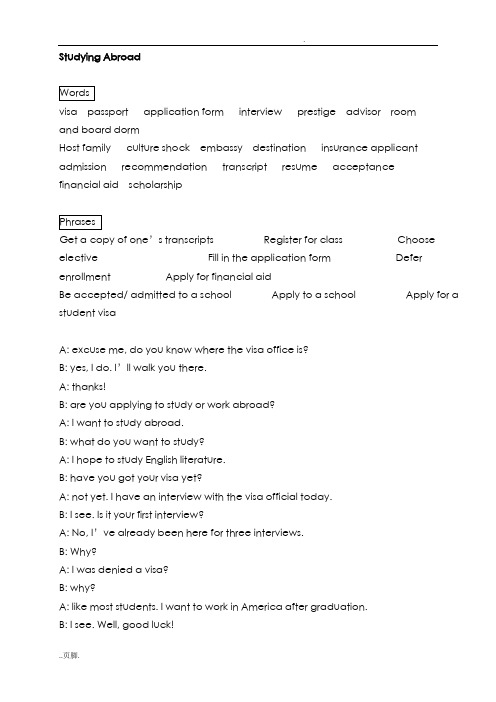
Studying Abroadvisa passport application form interview prestige advisor roomand board dormHost family culture shock embassy destination insurance applicant admission recommendation transcript resume acceptancefinancial aid scholarshipG et a copy of one’s transcripts Register for class Choose elective Fill in the application form Defer enrollment Apply for financial aidBe accepted/ admitted to a school Apply to a school Apply for a student visaA: excuse me, do you know where the visa office is?B: yes, I do. I’ll walk you there.A: thanks!B: are you applying to study or work abroad?A: I want to study abroad.B: what do you want to study?A: I hope to study English literature.B: have you got your visa yet?A: not yet. I have an interview with the visa official today.B: I see. Is it your first interview?A: No, I’ve already been here for three interviews.B: Why?A: I was denied a visa?B: why?A: like most students. I want to work in America after graduation.B: I see. Well, good luck!IntermediateA: guess what came in the mail today?B: what?A: my acceptance letter to Yale!B: wow! Congratulation! When do classes start?A: freshman orientation is the last week of August, but I want to go two weeks before that to get settled in.B: you’re so lucky! Do you have to do many things before you leave?A: yes. I’ll be very busy! I have to get a visa, buy a plan e ticket, and pack my things. But first, I want to register for classes.B: when can you do that?A: well, they sent me their prospectus, so I can start looking now. do you want to help me decide which classes to take?B: sure. What can you choose from?A: well, I have to take all the fundamental courses, plus a few from my major. B: what is your major?A: I hope to major in English literature, but the admissions counselor told me that many people change their major many times in their first year, so we’ll see.B: what are the fundamental courses?A: in order to graduate, every student must take a certain amount of classes in history, math, English, philosophy, science and art.B: interesting. That’s very different from the Chinese e ducation system.A: yes, it is. It’s also very different from the British education system.B: really?A: oh, sure. In Britain, students don’t have to take the foundation course s. B: why not?A: maybe because they think they know everything already! ha ha.Passports and VisasEmbassy application form immigration officer interview process identity card birth certificate tourist visa business visa settlement visa immigrantGo for an interview Fill in a form Get a visa Process an application Hand in an application Fill out an applicationRequest a visa Show your identity card Present documentsApprove an application Reject an applicationA: have you applied for your visa to go to study in the United States yet?B: yes, I have. I handed in my application form two weeks ago and I’m going for an interview next week.A: good luck! I’ve heard it’s very difficult to get a visa to go to the United States.B: the application forms are quite complicated. It took me a few hours to fill it out. The hardest thing was getting all the necessary documents. That took almost two weeks.A: what kind of documents did you need to present?B: I had to show documents relating to my financial status and of course my education, because I want a student visa.A: why do you think so many people have their applications rejected?B: I think that they don’t complete the forms correctly or they don’t include all the required documents. The embassy is very strict about it. You have to be quite careful.A: why are they stricter with Chinese people than with other nationalities?B: that’s simple. Many people break the rules regarding their visa conditions.IntermediateA: good morning. I’d just like to ask you a few questions about your visa application. Can you just check that the information here is correct?B: sure. …yes, that’s all correct.A: thank you. For your student visa, we need evidence of your financial status for the last five years. In your application, you only included it for four years. B: really? Let me check if I have the document here…yes, here is the document you need. I’m sorry. I must have forgotten to make a copy of it for you.A: thank you. That’s fine. The do cuments relating to your education are fine. The offer from the university is conditional on your English language proficiency test result. Do you have that yet?B: not yet. I took the test last weekend. The results will not be available for another two or three weeks.A: ok. Everything else is in order. I’ll be happy to give you a student visa, valid for the duration of your course, when you bring me a certificate showing the result of your language test.B: thank you very much. You don’t need any other documents from me to process my application?A: none. Make an application to see me when you receive your results. When you bring the certificate to me, bring you passport too. Then I can give you the visa.B: thank you very much.A: glad to help.过海关Officer: May I see your passport please?海关人员:我可以看一下您的护照吗?Henry: Sure, Here you are. And this is the declaration form.亨利:当然,给您。
朱彤口译经典片断
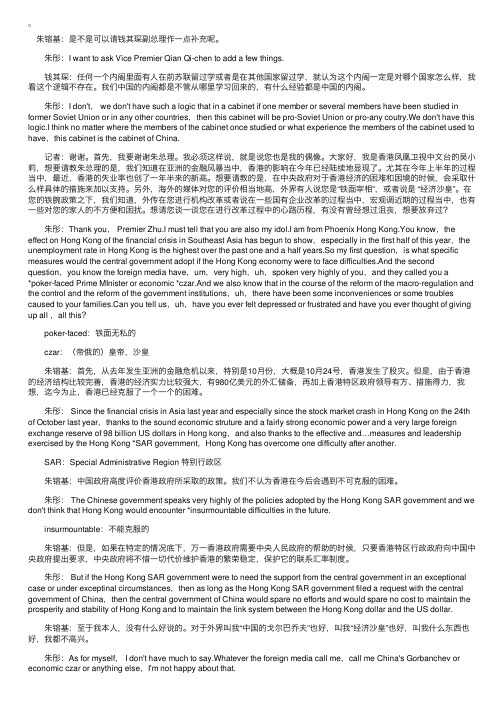
朱镕基:是不是可以请钱其琛副总理作⼀点补充呢。
朱彤:I want to ask Vice Premier Qian Qi-chen to add a few things. 钱其琛:任何⼀个内阁⾥⾯有⼈在前苏联留过学或者是在其他国家留过学,就认为这个内阁⼀定是对哪个国家怎么样,我看这个逻辑不存在。
我们中国的内阁都是不管从哪⾥学习回来的,有什么经验都是中国的内阁。
朱彤:I don't, we don't have such a logic that in a cabinet if one member or several members have been studied in former Soviet Union or in any other countries,then this cabinet will be pro-Soviet Union or pro-any coutry.We don't have this logic.I think no matter where the members of the cabinet once studied or what experience the members of the cabinet used to have,this cabinet is the cabinet of China. 记者:谢谢。
⾸先,我要谢谢朱总理。
我必须这样说,就是说您也是我的偶像。
⼤家好,我是⾹港凤凰卫视中⽂台的吴⼩莉,想要请教朱总理的是,我们知道在亚洲的⾦融风暴当中,⾹港的影响在今年已经陆续地显现了。
尤其在今年上半年的过程当中,最近,⾹港的失业率也创了⼀年半来的新⾼。
想要请教的是,在中央政府对于⾹港经济的困难和困境的时候,会采取什么样具体的措施来加以⽀持。
另外,海外的媒体对您的评价相当地⾼,外界有⼈说您是“铁⾯宰相”,或者说是 “经济沙皇”。
出国留学常用英语口语交流

出国留学常用英语口语交流出国留学是许多人实现梦想、拓展视野的重要途径。
在国外的生活中,良好的英语口语交流能力是至关重要的。
下面是一些出国留学常用的英语口语交流技巧和表达,希望对出国留学的朋友们有所帮助。
日常交流1.Greetings and Introductions:–Hey, how are you?(嘿,你好吗?)–Hi, I’m [Your Name]. Nice to meet you.(嗨,我是[你的名字]。
很高兴见到你。
)–What’s your major?(你的专业是什么?)2.Asking for Help:–Excuse me, could you help me find [place]?(对不起,你能帮我找到[地点]吗?)–Could you please repeat that?(你能请再重复一遍吗?)–I’m lost. Can you point me in the right direction?(我迷路了,你能指引我一下吗?)3.Making Plans:–Do you want to grab dinner together?(你想一起吃晚饭吗?)–What time should we meet?(我们什么时候见面?)–Let’s hang out this weekend.(这周末一起出去玩吧。
)学习交流1.Classroom Interaction:–Can you help me with this homework problem?(你能帮我解这道作业题吗?)–What did the professor say about the upcoming test?(教授关于即将来临的考试说了什么?)–I didn’t understand that lect ure. Can you explain it to me?(我没听懂那堂课,你能帮我解释一下吗?)2.Study Groups:–Let’s meet in the library to study together.(我们去图书馆一起学习吧。
留学咨询 话术 (2)
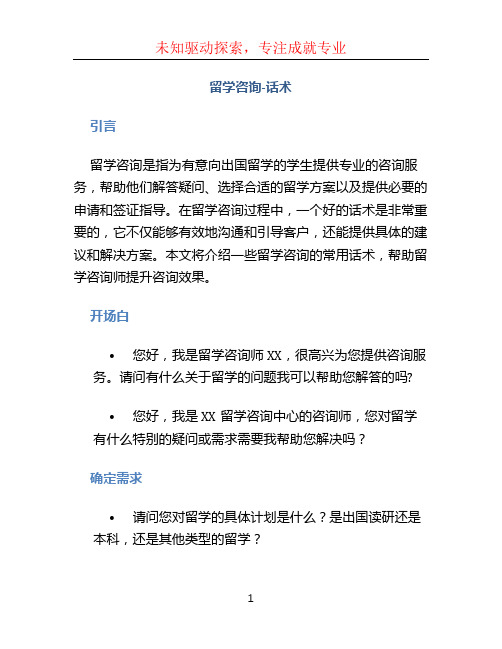
留学咨询-话术引言留学咨询是指为有意向出国留学的学生提供专业的咨询服务,帮助他们解答疑问、选择合适的留学方案以及提供必要的申请和签证指导。
在留学咨询过程中,一个好的话术是非常重要的,它不仅能够有效地沟通和引导客户,还能提供具体的建议和解决方案。
本文将介绍一些留学咨询的常用话术,帮助留学咨询师提升咨询效果。
开场白•您好,我是留学咨询师XX,很高兴为您提供咨询服务。
请问有什么关于留学的问题我可以帮助您解答的吗?•您好,我是XX留学咨询中心的咨询师,您对留学有什么特别的疑问或需求需要我帮助您解决吗?确定需求•请问您对留学的具体计划是什么?是出国读研还是本科,还是其他类型的留学?•您希望去哪个国家留学?有具体的目标学校或专业吗?•请问您对留学期限有任何限制吗?比如时间上的限制或者签证上的限制?提供信息•根据您的需求,我会为您提供相关的留学资讯和信息,包括国家的教育体系、留学申请流程、留学签证要求等。
•我们有丰富的留学案例和经验,可以为您提供成功的留学申请样例和参考。
•如果您对某个国家或学校有特别的关注,我可以为您提供更详细的信息和解答。
解答疑问•您有关于某个国家教育体系的疑问吗?我可以为您解答。
•对于留学申请流程上的不清楚,我可以为您一一解答。
•您对留学签证的问题有什么疑问?我可以提供相关的指导和建议。
引导选择•根据您的背景和兴趣,我可以为您推荐适合的国家、学校和专业。
•如果您对多个国家或学校感兴趣,我可以为您提供比较分析和建议,帮助您做出最合适的选择。
•我们还可以安排专业的咨询会议,与您进行更深入的沟通和了解,帮助您做出明智的决策。
提供解决方案•如果您遇到困难或问题,我们可以提供个性化的解决方案,以满足您的需求。
•我们可以为您提供留学申请材料的编辑和修改,确保申请的成功。
•如果您需要,我们还可以为您提供留学青睐咨询以及面试指导。
总结和再确认•总结一下,根据我们的讨论,您的需求是……是这样吗?•您有任何其他问题需要我解答吗?•如果您对我们的服务感到满意,我们可以进一步安排面谈或下一步的流程。
出国留学的金句

出国留学的金句1. 出国留学就像打开了一扇通往全新世界的大门,你不想去看看门后面有什么吗?就好比你一直生活在一个小乡村,突然有机会去繁华的大城市,难道你会不兴奋?例子:我当时就毫不犹豫地选择出国留学,那感觉就像要去探索一个神秘而又充满惊喜的宝藏世界。
2. 出国留学,那可是给自己人生来一场华丽冒险的绝佳机会啊,你还在等什么?这就像你一直渴望攀登高峰,现在机会就在眼前!例子:朋友小李听到出国留学的消息,眼睛都亮了,立马开始准备,他说这是他的大冒险。
3. 出国留学能让你快速成长,这不是空话,这简直是真理啊!难道不比你一直待在舒适圈里强得多?就像小鸟要学会飞翔就得离开巢穴。
例子:我表妹出国留学回来后,整个人都变得成熟自信了,真的像换了一个人。
4. 你知道出国留学意味着什么吗?那是拥抱无限可能啊!这和在一条已知的道路上走可不一样,这是踏入未知但充满希望的领域。
例子:小王出国留学后,接触到各种新奇的事物和机会,他说就像进入了一个奇幻乐园。
5. 出国留学是拓宽视野的最好途径,这还用说吗?就好像原本你只能看到眼前的一小片天地,一下子能看到整个广阔的天空了。
例子:邻居家的哥哥从国外回来,给我们讲了好多外面的故事,让我们好生羡慕。
6. 出国留学不是一件容易的事,但收获也绝对超乎想象啊,你敢不敢挑战一下?这不就像攀登一座很难爬的山,但山顶的风景无与伦比。
例子:我同学在国外吃了不少苦,但他说那些经历让他变得无比强大。
7. 还在犹豫要不要出国留学?别傻了,这是改变命运的契机啊!就如同你原本在黑暗中摸索,突然出现了一道亮光。
例子:我就是抓住了出国留学的契机,从此人生轨迹都不一样了。
8. 出国留学,那可是让你变得与众不同的绝佳方式,还不赶紧行动?这就好像别人都穿着黑白衣服,而你穿上了绚丽的彩衣。
例子:看到那些从国外回来很有个性的人,真的觉得出国留学太神奇了。
9. 别错过出国留学的机会呀,那是你能真正认识自己的好时机,真的!就像在茫茫大海中找到属于自己的方向。
留学情景对话英语聊天话题: 闲聊体育
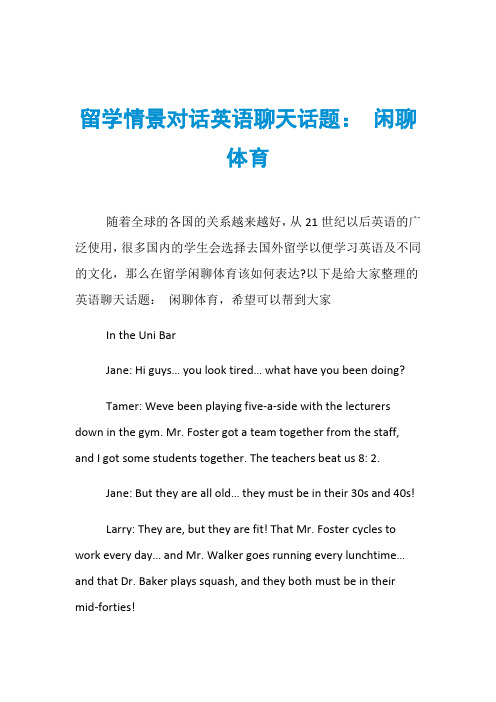
留学情景对话英语聊天话题:闲聊体育随着全球的各国的关系越来越好,从21世纪以后英语的广泛使用,很多国内的学生会选择去国外留学以便学习英语及不同的文化,那么在留学闲聊体育该如何表达?以下是给大家整理的英语聊天话题:闲聊体育,希望可以帮到大家In the Uni BarJane: Hi guys… you look tired… what have you been doing?Tamer: Weve been playing five-a-side with the lecturers down in the gym. Mr. Foster got a team together from the staff, and I got some students together. The teachers beat us 8: 2.Jane: But they are all old… they must be in their 30s and 40s!Larry: They are, but they are fit! That Mr. Foster cycles to work every day… and Mr. Walker goes running every lunchtime… and that Dr. Baker plays squash, and they both must be in their mid-forties!Jane: Yes, but theres another thing…. you guys smoke, and the lecturers dont. And I think maybe youre a bit scared to tackle them hard as well because they are your lecturers… am I right?Tamer: Maybe, but I bet on a proper football field wed run rings round them! Do you girls play any sports, Alison?Alison: Well, Im in the uni hockey team actually.Sarah: Yeah… and I play volleyball. We play tennis on Saturday mornings as well.Larry: So, do you play against the teachers as well?Alison: No. It doesnt seem to be what older women want to do. I think your teachers are just trying desperately to stave off old age!Sarah: That, or pretend they are still young!Tamer: Anyway, I think it would be a good idea to organise a mini-league. You know, different national groups.Larry: I think different departments would be better. It would be really good for bonding.Loud Drunken Singing from Another TableLarry: Oh no… its the rugby club having another piss-up!Sarah: Yeah… theyre always getting drunk and singing rude songs and stuff.Tamer: Well… its all part of the tradition, isnt it… they behave like hooligans in the bar, but theyre supposed to be gentlemen outside… I mean, its mostly middle-class students who play rugby, isnt it?Sarah: Yeah… what is it they say? “Soccer is a game for gentlemen, played by hooligans, and rugby is a game for hooligans played by gentlemen.” My flatmate told me that football is a traditionally working-class game.Tamer: Yes. Rugby is a really rough game. It looks it anyway.Alison: What is rugby, anyway? Is it like what they play in America?L arry: No, no… its only the ball thats the same shape… basically, they have no protection like they do in American football… no helmets and padding and stuff… it looks really scary.Tamer: Yeah… rugby players get to act out their violent fantasies on the rugby field, get drunk and behave like hooligans inthe bar and then go to work as doctors and lawyers on Monday morning.Larry: Yes… whereas when football players do that they call them hooligans!Alison: But I guess its good… I mean, at least it c ontrols their aggression.Sarah: Its great… all the opportunities we have to play sports here. I mean, they even have womens rugby, football and cricket teams… did you know that?Tamer: What are the rules of cricket, by the way?Larry: I dont think we should even go there! You have to be English, born-and-bred to understand them.Sarah: Or from the Commonwealth countries. Also, Ive heard that in India and Pakistan they are even madder about cricket than the English!Alison: Yeah… and in Austr alia and South Africa too.在学生会酒吧简:嗨,伙计们。
- 1、下载文档前请自行甄别文档内容的完整性,平台不提供额外的编辑、内容补充、找答案等附加服务。
- 2、"仅部分预览"的文档,不可在线预览部分如存在完整性等问题,可反馈申请退款(可完整预览的文档不适用该条件!)。
- 3、如文档侵犯您的权益,请联系客服反馈,我们会尽快为您处理(人工客服工作时间:9:00-18:30)。
Do you remember anything about your childhood?Where were you born?Born-->bearI was born in a small town/village called Taixing.Born rich--->出生富贵I feel like reborn.where did you live when you were young?I have been living in the same place for my whole life.I grew up in a town called Taixing and this pleasant Spring takes me back to my hometown/childhood.that noodle smell great.it really takes me back to my childhood.I spent my childhood in a village called Taixing.what kind of upbringing did you have?were your parents strict with you?I guess my parents didn't really bring me up too strictly.bring sb.up哺育某人I was actually raised up by my grandparents,who tended to spoil me somehow.spoil sbspoil my stomach.spoil oneself=give myself a treatwhat did your parents teach you when you were a kid?--I was brought up to be polite and respectful.they tried to let me make my own mistakes.(自己发现自己的问题)I think it was because they wanted me to be able to stand up for myself (勇敢面对).Do you have any siblings?Do you have any brothers or sisters?one child policycousinI don't have any,but I have four younger cousins from my father's side. do you get on with them?get on with与sb相处的如何yes,we get on well now.we have great time when we see each other.But we didn't get on very well when we were children.we used to argue and fight about everything.I used to smokeI used to drink,but I don't do it now.educationif I want to get ahead,I need a good education.get ahead取得成功.I hope to carry on further education,and that's why I want to study in your country,which has the most prestigious university in the world. carry on持续,继续做...Can you carry on?-let’s carry on.what were your school days like?I suppose I got on okay.I wouldn't say I was quite successful,for most of the time,I got on okay. suppose猜想you are not supposed to come back at home in this moment.you are supposed to at school.but sometimes I was quite naughty and messed around,just like most kids.Messed around瞎混.Were you a good student?no,I'm not a good student,because I usually got down to work in the end.got down to着手处理Luckily,I got through all my exams.got through通过you can't imagine how much hardship l have gone through when I managed to pass the entrance examination,and went on to university to receive higher education.managed to设法Went on to接着,继续you can't imagine how bad it was.I managed to pay back all my debt.are you feeling OK?I don't think you're looking too well today.no,not really.I have got a temperature,a headache,a sore throat.oh dear,I would say you’re going down with the flu or chicken pox. yes,I think so too,but I have got to fight it off.go down with染上....样的病Fight sth off竭力摆脱.what can we do to get rid of flu?some pain killers should bring your temperature down.pain killer止痛片Bring sth down把...降下来if you’re feeling hot and unwell,drinking water will stop you from being so hot,which means cold water will cool you down too.what else can we do to get rid of flu?having a bit of a lie down will also make you feel better.make sb feel betteryou will get it over very soon if you follow what doctor said.get...over恢复.Moving into a new placehi,I heard you've got a wonderful new flat楼房/apartment楼房/house (独栋)that's great,I have just moved in.you must come round sometime. come round顺道拜访thanks,I would love to come to visit.would love to sth特别想做sthI would love to have some more,it's really nice.why don't you come round next week then.why don't you do sth.Why don't you look after it well.why don't you carry on umbrella with then.visiting one's new homehold on a second/minuteso glad you could come round.come on in.this is a fantastic house.let me hang my coat up and put my scarf on the same hook,too,just in case I forget.I'll show you around,let's have a look at the living room first.show sb around带某人看看逛逛this is such a great house,you're so lucky,I'm very jealous,if I were you, I definitely won't be moving on for a while.I would want to stay in. thanks,it's only been a week and feel like I have been here for years.I settled in already.settled习惯,安顿下来I have brought you some champagne to celebrate.a toast to your new flat.let's drink to the flat,cheers.let's have a toast to the new bride and groom,happy marriage.house warming partyguests are coming over to my place for a house warming party and I'm getting in lots of crisps and alcohol to keep them happy.get in购买Why don't you put another CD on.this is a great song to join in and dance to.the lyrics even say‘get down‘which means to dance.this party food is delicious.eat up.there's plenty more.thanks,it's great I'll have no problem eating them up,it's lovely.drink upI'll go and make you anther cocktail.you are a great host.hang on then and I'll finish this first.hang on=hold onClothesI have just been buying some new clothes.I have got a brand new outfit.when I'm on my shopping trip,I don't just do window shopping,I love to try on new clothes,because I want to see if clothes in shops fit me or not.I'm doing some Internet videoing,and I have to dress up,which means to wear something formal.I always try to make an effort to look smart. dress up打扮正式make an effort to努力做sthlook smart看上去精神but if I'm not getting on TV or Internet,I can dress down,which means I can wear something casual.when I finish videoing,I have got to do some running so I need to wear my sports outfit instead.Datingyou're standing in the rain waiting for you date,you have been wait for a long time.it looks like they have stood you up.stood you up让某人空等,放某人鸽子it's horrible being stood up.horror movie恐怖电影you feel that they’ve let you down,which means they've not done what they said they would do.if people stood you up,the next time you see them,you'll probably fall out it means you'll argue or quarrel with them.fall out闹翻争吵you never want to see them again as long as you live.many friends fall out over food/money.you might even decide to end the relationship or break up with your friends.but sometimes,people break up,and then they make up again.they stop arguing and think they'll give it another try.再试一试some couples seem to be breaking up and making up again all the time. if someone was really special to you,you need time to get it over.恢复you need some time to get used to live without them,to accept the end of the relationship.move onmeet someone newstarts over againCareerdo you have a glittering career?is it all you even dreamed it would be?well-paid,nice office,company carhow are you getting on at work?get on怎么样how well are things going for you at work/in life/at schoolI'm so lucky to land a dream job in my ideal company.it was difficult to get employed,but I managed to pass the tests and successful in the interviews,and get in.(be accepted)I have just been promoted(I have got a more important job now)I'm really heading for the top.this job is taking over my life,because I have to work longer and harder than before.I really think this job makes me run out of time to do other things in my life.run out of time没时间Take over占据Get employed被聘用I have got to slow down,otherwise I'll be too tired to do anything.and I'm going to burn out and won't be able to do my job probablyanyway.burn out燃尽I need to pace myself-work more slowlypace按部就班don't run out of steam before you get to the top.(I don't want to use all my energy before I can get promoted again) promoted晋升。
